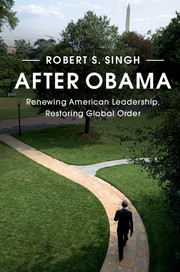Book contents
3 - “45”: prospects for renewal
Published online by Cambridge University Press: 05 May 2016
Summary
Two objections are typically raised to the case for the next administration advancing beyond the Obama Doctrine. Both are serious and widely supported among scholars of US foreign policy and international relations, meriting direct and full discussion here.
One powerful rejoinder is that America is simply but irrevocably stuck in an inexorable decline that dates back at least to the financial crisis of 2008, the Iraq invasion of 2003 or even earlier. Realistically, no administration – Democratic or Republican – can feasibly reverse the structural atrophy of US power, even if it so desired. Nor can it hope to tame the rise of independent great powers on every continent that collectively diminish Washington's room for foreign policy maneuver. As such, arguments for reclaiming the predominant strategic culture that predated Obama are moot and, in the pejorative sense of the term, academic. Although the subject still has relatively little salience in terms of the daily preoccupations of American public life, the theme of superpower decline and concomitant notions that America's best days are behind it have often accompanied periods of internal division or introspection since the 1950s. Few commentators care to put it this way, but Obama's negative emphasis on the limits of power belied his more general embrace of a positive, “yes, we can” approach to change and progress. Or, perhaps more precisely, the self-imposed limits on America's global role were designed to facilitate the administration's progressive political, economic and social agenda at home. The costs of diminished international influence were eminently bearable. This declinist case is addressed, and respectfully challenged, in the next chapter.
A second forceful objection, distinct but related to the declinist argument, is less focused on power than purpose. On this view, there still exists either no, or at best minimal, appetite in the United States for a more assertive foreign policy. At its most elemental, neither the money nor will are there. Whatever one reckons to debates over national decline, the Obama administration and congressional Democrats won office in 2008 on a clear platform of butter over guns and faithfully reflected the insular turn in public opinion.
- Type
- Chapter
- Information
- After ObamaRenewing American Leadership, Restoring Global Order, pp. 42 - 71Publisher: Cambridge University PressPrint publication year: 2016



